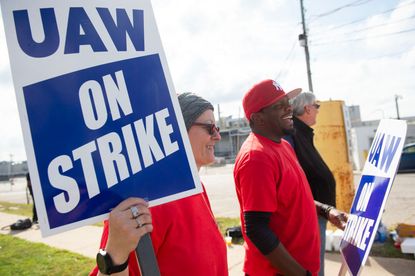Stocks opened lower Friday and kept sliding into the close. Weighing on investor sentiment was the United Auto Workers (UAW) strike, which officially began today after contract negotiations between union leaders and the country’s three largest automakers stalled ahead of last night’s deadline.
Market participants also looked ahead to next week’s Fed meeting following a recent batch of mixed inflation data.
The “Big 3” automakers involved in contract negotiations – Ford Motor (F, -0.1%), General Motors (GM, +0.9%) and Stellantis (STLA, +2.2%) – all opened the day in negative territory but finished well off their session lows.
Subscribe to Kiplinger’s Personal Finance Be a smarter, better informed investor.
Save up to 74%
Sign up for Kiplinger’s Free E-Newsletters Profit and prosper with the best of expert advice on investing, taxes, retirement, personal finance and more – straight to your e-mail.
Profit and prosper with the best of expert advice – straight to your e-mail.
But it’s not only the impact on this trio of consumer discretionary stocks that investors must be aware of. While the strike is currently limited to one factory per automaker, if it expands, “investors can expect to see an impact on the broad economy and pressure on supply chains and corporate profit margins,” says Mark Hackett, chief investment officer of Nationwide. “This could also put upward pressure on used car prices, reigniting inflationary pressure.”
Fed meeting on deckMeanwhile, chatter continues to build around the next Fed meeting, which is scheduled to kick off Tuesday and conclude Wednesday afternoon with a policy announcement.
The central bank is widely expected to hold interest rates steady this time around, which “will repeat the first part of the skip-hike pattern established three months ago,” says Michael Gregory, deputy chief economist at BMO Capital Markets. “And, market participants will be scouring the policy statement, the Summary of Economic Projections (SEP) and Chair Powell’s presser for clues on the second part.”
As of now, futures traders are pricing in a 33% chance the Fed will hike rates in November, down from 44% one week ago, according to CME Group.
Planet Fitness sinks after CEO firingIn single-stock news, Planet Fitness (PLNT) spiraled 15.9% after the gym chain’s board of directors unexpectedly fired long-term CEO Chris Rondeau, who had served in the top spot for 10 years. As part of the separation agreement, Rondeau will continue to serve on the company’s board and be nominated for reelection at next year’s annual meeting. “The management change is not the result of any material or unexpected financial events,” Planet Fitness said in a press release.
PLNT shares are now down 36% for the year-to-date, but Wall Street remains bullish. Of the 19 analysts covering the stock tracked by S&P Global Market Intelligence, 11 have it at Strong Buy, six say it’s a Buy, one has it at Hold and one rates it at Sell. This works out to a consensus Buy rating.
Elsewhere, Adobe (ADBE) tumbled 4.2% after the software company reported earnings. In its third quarter, Adobe reported higher-than-expected earnings of $4.09 per share on in-line revenue of $4.9 billion. Goldman Sachs analyst Kash Rangan says the selloff may be a reaction to Adobe’s in-line Q4 guidance, especially after the company unveiled new pricing plans for its suite of generative AI (artificial intelligence) offerings.
Still, Rangan maintained a Buy rating on the tech stock amid expectations it will remain “a beneficiary of generative AI.” And despite today’s post-earnings decline, ADBE stock remains a long-term outperformer, having generously rewarded investors over the last 20 years.
As for the major indexes, the Nasdaq Composite fell 1.6% to 13,708, the S&P 500 shed 1.2% to 4,450, and the Dow Jones Industrial Average gave back 0.8% to 34,618.
Related contentWill the U.S. Dodge a Recession?: Kiplinger Economic ForecastsKiplinger’s Weekly Earnings Calendar for This WeekCasino Operators Caesars and MGM Still Reeling From Cyber Attacks
